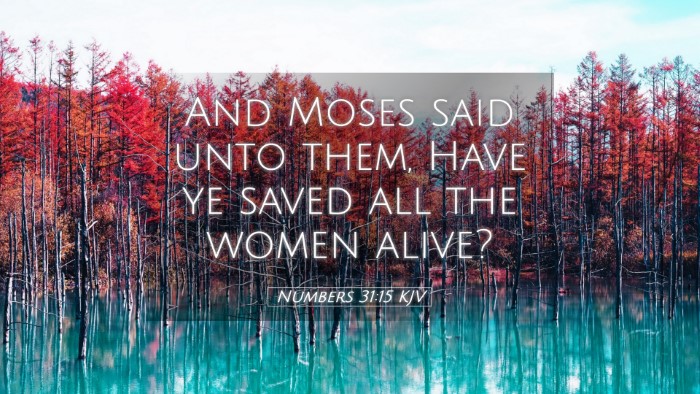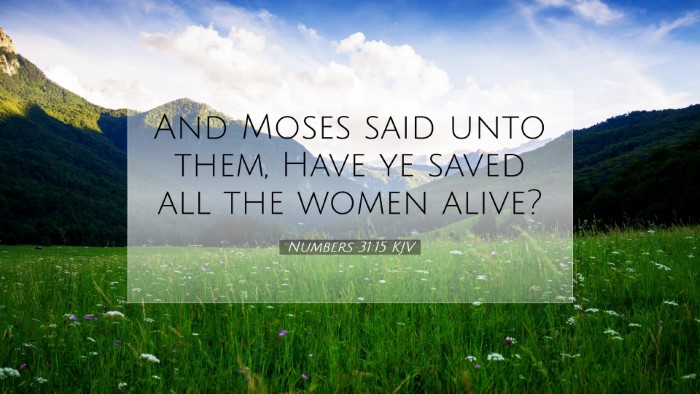Commentary on Numbers 31:15
Verse Reference: Numbers 31:15 - "And Moses said unto them, Have ye saved all the women alive?"
Contextual Background
The book of Numbers delineates the journey of the Israelites from Sinai to the Promised Land. The context surrounding Numbers 31 involves the aftermath of Israel's conflict with Midian. God commanded Moses to take vengeance on the Midianites for their leading the Israelites into sin (Numbers 25). This chapter highlights the consequences of idolatry and the preservation of holiness among God's people.
The Authority of Moses
Moses' authoritative role is evident as he addresses the Israelites post-battle. His inquiry, "Have ye saved all the women alive?" not only illustrates his concern for the purity of the Israelite community but also serves as a reflection of his obedience to God’s commands regarding the treatment of captives.
Albert Barnes remarks on Moses’ authority in his leadership, stating that he was tasked with ensuring that the covenant community remained undefiled. The direct query implies a significant moral concern regarding those preserved during the conquest.
The Fate of Captives
The question posed by Moses indicates a crucial moral and theological dilemma. Matthew Henry notes that the preservation of the women suggests an underlying issue of temptation and moral integrity among the Israelites. Historically, women captured in war were often absorbed into the conquering society, which raised questions about faithfulness to God’s commands and the potential for idolatry through intermarriage.
- Theological implications: The survival of women could lead to future entanglements with idolatrous practices.
- Moral considerations: Protecting the sanctity of the Israelite lineage was paramount.
The Implications of Saving the Women
Adam Clarke emphasizes that Moses was alerting the people to the risks inherent in their actions. By sparing the women, they risked bringing back influences that could corrupt their faith and practices. He underscores that this chapter serves as a warning regarding the dangers of accommodating the values of surrounding nations.
Teaching Purity and Holiness
Moses’ inquiry reflects a broader theological theme of maintaining holiness within the covenant community. The preservation of these women not only involves physical survival but also carries connotations of spiritual integrity. Henry articulates that God’s commands must govern the actions of Israel, calling for separation from those who threaten their allegiance to Yahweh.
Lessons for Contemporary Believers
This passage serves as a powerful reminder to modern believers about the necessity of vigilance in maintaining spiritual purity. Barnes points out that just as Moses was tasked with ensuring the fidelity of the Israelites, today’s church leaders are called to guard against influences that may lead believers astray.
- Accountability: Church leaders must hold themselves and their congregations accountable to God’s word.
- Awareness: Believers should be discerning about the influences they allow into their lives.
Conclusion
Numbers 31:15 presents a pivotal moment in the history of Israel, encapsulating themes of purity, authority, and the danger of moral compromise. The admonition given by Moses serves to remind leaders and congregations alike of the importance of adherence to God’s standards. As Adam Clarke notes, the support of their ethical commitments directs the faithful community towards a holy life reflective of God's will.
In conclusion, the significance of this verse extends beyond the historical context, calling all followers of Christ to a deeper understanding of their commitment to holiness, truth, and spiritual vigilance in their daily lives.


